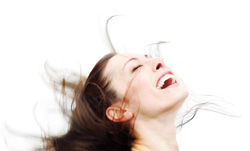 Dye young?
Dye young?
Feeling old? It could be all in your head, according to a new study by researchers at Harvard and MIT who found that we often get cues from our environment that make us feel older than we really are. Scientists identified five different circumstances that affect our perceptions of age — and found that changing those perceptions may actually result in better health. In one circumstance, they discovered that some women who have their hair dyed actually feel younger — and they experience a decrease in blood pressure, to boot! The study also indicated that women who have children later in life have a longer life expectancy, possibly because they get so many younger-age-related cues. And if you married someone quite a bit younger than yourself, congrats! Older spouses tend to live longer lives; their more youthful partners keep them feeling young.
PMS rescue?
Here’s promising news for sufferers of premenstrual syndrome (PMS): Researchers say they’ve developed a pill containing essential oils that significantly reduces PMS symptoms, such as headaches, nausea, breast tenderness and moodiness. The pill — which contains 2 grams of essential fatty acids and vitamin E — had a “significant” effect on PMS symptoms after three months.
It appears to work without causing an increase in a woman’s cholesterol, or any other negative side effects. About 75 percent of women will suffer from PMS symptoms at some point during their childbearing years; according to the National Institutes of Health, these symptoms tend to get worse as a woman enters her late 30s and 40s.
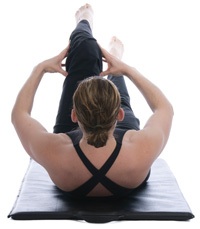 March’s List
March’s List
Age-proof your health
Staying healthy and happy at every age depends very much on your choices — a lot of them! Doctors at the University of Texas have come up with a set of health goals for women at every age and stage.
In your 20s:
• Skip the tan: Using a tanning bed significantly ups a woman’s odds of getting melanoma.
• Avoid HPV: The human papilloma virus (HPV) is present in more than 99 percent of cervical cancer cases. Practice protected sex and get the HPV vaccine.
In your 30s:
• Lift weights. Most women lose muscle mass after the age of 30. Adding strength training can help, and also build bone density.
• Relax a little: Chronic stress wreaks havoc on pretty much every system in your body. Take time to chill!
In your 40s:
• Watch it! Maintain a healthy weight as your metabolism slows down. Get plenty of exercise.
• Stick to a healthy diet to keep off unwanted pounds.
In your 50s:
• Limit the use of hormone therapy, which might increase your risk of certain cancers, heart disease and more. Talk to your doctor about healthy ways to deal with symptoms of menopause.
In your 60s:
• Stay socially active — you’ll live longer and stay healthier. Almost 10 million people older than 65 live alone, according to U.S. Census Bureau data. That can lead to loneliness and depression.
Source: University of Texas, M.D. Anderson Cancer Center
HealthWatch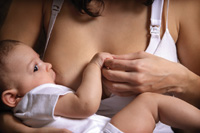 Breast friends
Breast friends
Breastfeeding is getting a high-profile boost. U.S. Surgeon General Regina Benjamin, M.D., has just announced a “call to action” to support breastfeeding. Benjamin wants everyone to make it easier for moms who want to breastfeed. Right now, about 75 percent of all new moms in the U.S. start out breastfeeding, but that number drops to 13 percent by the time the baby is 6 months old. Among the steps Benjamin is calling for: lactation-support programs in the workplace.
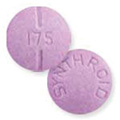 Feeling hypo?
Feeling hypo?
Sluggish? Forgetful? Chubby? If you’ve been battling these symptoms, you could have a problem with your thyroid. Hypothyroidism affects about 5 percent of the U.S. population — most of them women, and many don’t know they have it. A zonked thyroid means your body isn’t making thyroid hormone anymore. Ask your doctor if you should have the simple blood test. The missing thyroid hormone can be replaced with medication.
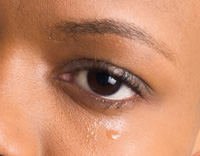 Cry, baby
Cry, baby
Fascinating research in the journal Science: Researchers have found that women’s tears actually lower men’s libidos — although scientists aren’t sure why. When a woman cries, certain chemicals in her tears trigger a reaction that reduces sexual arousal in males. A man exposed to a crying woman will experience reduced physiological effects of libido, such as heart rate and skin temperature, and a considerable drop in testosterone levels.
 Java the Hut
Java the Hut
Coming to a Starbucks near you: the Trenta! Starbucks is rolling out a new 31-ounce size for iced drinks only. Beginning on May 3, you’ll be able to order an iced coffee that may actually be larger than the capacity of your stomach! Ordering a Trenta (which means “30” in Italian) will set you back about 50 cents more than the paltry 24-ounce Venti. Those extra 7 ounces contain about 100 mgs. of caffeine — it’s like adding a shot of espresso to your day.











